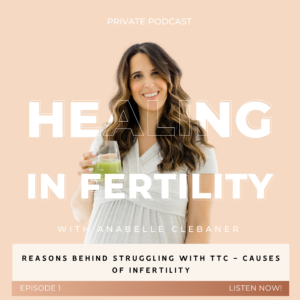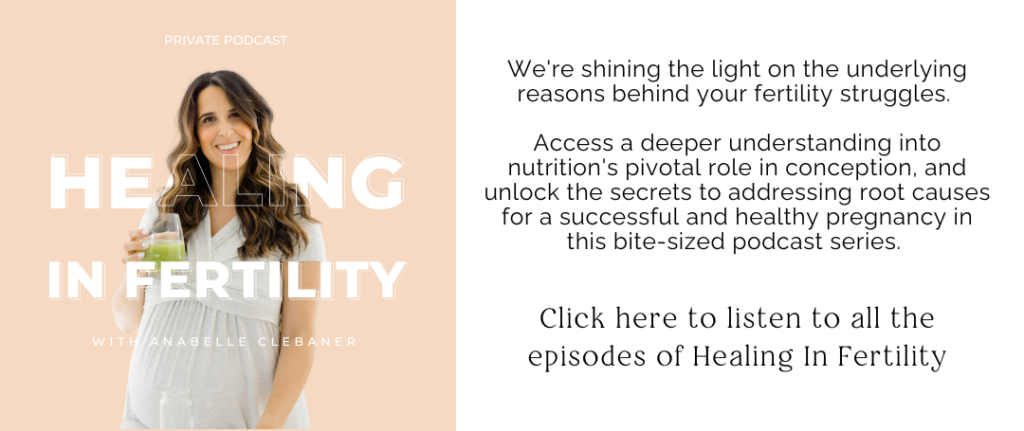Registered dietitian, functional nutritionist, & your new fertility BFF. I'm passionate about helping women thrive during preconception, pregnancy, and postpartum.
Nutrition
PCOS
Fertility
View All
Explore the blog
Hi, I'm Anabelle
Non-toxic Living
Work with our team
Episode 1: Reasons Behind Struggling with TTC – Causes of Infertility
If you want to listen to the full episode head over to: www.wellspringnutrition.co/healing-in-fertility
Transcript:
Welcome to the Healing infertility Podcast. I’m your host, Anabelle Clebenar, registered dietitian, functional nutritionist, and your new fertility bestie. Today in our first episode, we’re going to explore the reasons why you may be struggling to conceive and take a look at some of the causes that I typically see when it comes to clients struggling to conceive naturally. Now, for some, getting ready to start a family is this really easy dragon process. But for many, many couples, the challenges of trying to conceive take a huge mental and physical and emotional toll. And today, I really want to cover some of those contributing factors that I tend to see with clients and hope that this can give you some insight and to take some proactive steps to addressing these things and hopefully improve your chances of conceiving naturally. Now, obviously, there’s many reasons why a couple may be struggling to conceive. There could be things like chronic diseases.
There could be issues with sperm quality, structural issues like a tilted uterus or blocked fallopian tube. And today, I’m going to cover some of the most common things that I see with clients when it comes to not being able to successfully conceive naturally. So the first contributing factor that I want to talk about is excess stress. This is the type A girlies, the women who thrive off intense exercises like Barry’s Boot camp or Orange Theory. Five to six times a week, these women need their morning coffee, an afternoon coffee. They tend to worry a lot about the future and possibly have anxious tendencies. These women are expert multitaskers. They have their work piled high, they strive for perfection, and they tend to put a ton of pressure on themselves.
So if you’re nodding your head yes to this, definitely continue to listen on. So being in a constant state of stress actually triggers the release of cortisol, which is a hormone that can suppress other essential reproductive hormones, specifically progesterone. So with these women, I see a lot of imbalance in cortisol, whether that means that their cortisol is sky high or it’s actually tanked low because it’s been so high for such a long time that now the body is not responding to that signal. And they have chronically low cortisol. So these stressors can come from a variety of things like over exercising, undereating mental stress, the stress of high expectations. All of these can be contributing factors to infertility. So why does this happen when we push ourselves too hard in the gym? Or if we’re not giving our bodies enough fuel that can actually throw off our balance of hormones? So this can impact your menstrual cycle? It can affect when we push ourselves too hard in the gym or not giving our bodies enough fuel. This can mess with our menstrual cycles and throw off the delicate hormone balance.
How Do Intense Workouts Impact Fertility?
So intense exercise like Orange Theory without proper rest can disrupt hormone production and our menstrual cycle. And the same thing with not consuming enough calories or essential nutrients. This can also lead to irregular ovulation, your period going Mia, having a short luteal phase, or just periods that absolutely suck because they’re so freaking painful. And all of this comes back to stress. So it’s been shown in research that chronic stress can impact everything from your digestion, your immune system, detox systems, hormones, memory. It can cause brain inflammation, and it can also impact your gut health. So stress really touches all parts of our health, which is why this is one of those main contributing factors that I tend to see come up over and over again for so many women. So addressing that chronic stress is going to be so important for not only conceiving, but also maintaining a healthy pregnancy and preventing early loss.
The second contributing factor to infertility that I see quite often is poor blood sugar management. So if you’ve ever experienced a sugar high after having too much soda or candy or cookies or anything like that, you know exactly what I’m talking about. So unstable blood sugar can cause things like insulin resistance, delayed ovulation, irregular periods, and it can even affect egg quality. So for women with unmanaged diabetes or insulin resistance, they’re particularly at risk for fertility challenges because of this reason. This is also true for women with polycystic ovarian syndrome or PCOS, because their body has a harder time digesting and breaking down carbohydrates, and that leads to more insulin resistance. This is often a root cause to a lot of fertility struggles, even in women who don’t have PCOS or insulin resistance. Because the way that we tend to eat in general, making a generalization here, but the way that we’re taught to eat isn’t necessarily the best way to improve our metabolic health. So for many women, they’re undereating protein and overeating carbohydrates or overeating fats.
And not having a proper grasp on how to eat for blood sugar management can cause a cascade of events that will make it harder for your body to conceive. This also causes inflammation, and blood sugar imbalances are so pervasive. That’s why it’s so important to make sure that you’re eating a real good balance of macronutrients and not relying on your carbs. Scratch that last part. Okay, so not only does blood sugar imbalances lead to inflammation, but it also impacts egg quality, increases your testosterone, and delays ovulation. The third contributing factor to infertility that I run into a lot with clients is excess inflammation. Inflammation is the body’s natural response to injury, infection, or any harmful stimuli. So, for example, when we get a cut or an infection, inflammation is your body’s way of sending healing agents to the affected area to fight off those invaders and initiate the repair process.
Unraveling the Impact of Chronic Inflammation
It’s like an alarm going off and then someone coming in to address the person trying to invade. What happens when we have chronic inflammation that persists for a long time? Is it can cause health issues, including those related to fertility. So we have good biomarkers to be able to tell when someone has high inflammation. So, for example, Creactive protein, or CRP, this is a marker of inflammation. However, if someone comes back with high CRP, we need to figure out where that inflammation is coming from. For some clients, this can be inflammation from a parasite in the gut. It could be from bacterial overgrowth, or it could also be from not having enough beneficial bacteria. So, especially for women who have had multiple rounds of antibiotics, I often see their gut results being really low.
And having low beneficial bacteria can also cause inflammation. So, how does this impact fertility? So, when we have inflammation that’s chronic, it disrupts our hormone balance, which, again, is crucial for ovulation and conception. Chronic inflammation can also affect the health of egg quality and sperm quality, making it harder for fertilization to occur. Inflammation in reproductive organs can lead to scarring and damage, which can also further complicate things. And when we’re thinking about a functional approach to fertility, we’re always looking for the root cause. So, why is there inflammation and where is it coming from? That way, we can address it, calm down the inflammation, and make our bodies a safe place for reproduction to occur. The last bucket of a possible the last category that I want to talk about is micronutrient deficiencies. I tend to see this a lot with my mamas, with secondary infertility, after going through pregnancy, birth, breastfeeding, there tends to be a lot of nutrient and mineral deficiencies.
But even if you aren’t dealing with secondary infertility, the way that our food system is set up, the way that our medical system is set up, there’s so many ways that this can cause nutrient and mineral deficiencies in our bodies. Whether you’re taking certain medications or coming off of birth control, all these things impact our nutrient levels. So I’m sure you know that our bodies require a wide range of vitamins and minerals to function optimally, and fertility is no exception. So, micronutrient deficiencies like folic acid, zinc, iron, vitamin D, vitamin A, magnesium these can all impact reproductive health. And these nutrients play a critical role in supporting the development of a healthy fetus and a successful pregnancy. Mineral imbalances also impact fertility. So, for example, when we’re thinking about zinc, an excess of copper in the body can interfere with zinc absorption, which leads to hormone imbalances. So we’re always trying to see what the possible root cause can be.
And for some women, it can be all four of these things together. For some, it’s just one thing. But we’re always trying to figure out what is the cause of someone struggling to conceive and how can we address it? So, as a functional dietitian, I often recommend these comprehensive tests, whether it’s a stool test or a mineral test, a micronutrient test to really tailor personalized nutrition plans to support women on their preconception journey. And the upside to all these causes of infertility is that there’s a way to address them naturally using a combination of functional lab testing, supplements and nutrition protocols. So I’m really excited to share more with you in the coming episodes. And if you found this episode to be helpful, please share it with a friend who’s also on the road to Motherhood. I’ll see you in the next episode. Bye.
Leave a Reply Cancel reply
The Preconception Playbook
This free playbook provides specific actionable tips to get started on your fertility journey, as well as what to avoid while you're trying to conceive.
Get the free playbook
Functional nutrition for women & couples trying to conceive
Get the Preconception Playbook
Actionable tips to get started on your fertility journey, as well as what to avoid while you're trying to conceive.



Be the first to comment